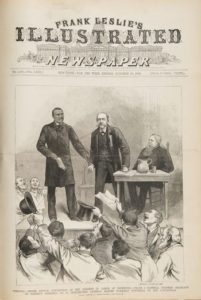
*The Knights of Labor (KOL) began on this date in 1869. Founded in Philadelphia, the Knights of Labor was America's largest labor union in the 19th century. Uriah Stephens founded it, and James L. Wright and a small group of Philadelphia tailors founded a secret organization, the Noble Order of the Knights of Labor.
Created during the American Reconstruction Era, the KOL opened its membership to black and women workers, which made it a desegregated organization. Before the KOL, nearly all unions were workers in a specific trade or craft. Still, craft unions' emphasis on exclusive membership left them little influence vis-à-vis employers. Also, craft unions generally refused to organize women and nonwhites. By contrast, a core of the Knights' philosophy was "solidarity," which meant that unions must organize all workers, regardless of craft, skill, sex, race, or nationality. The KOL motto was, "An injury to one is the concern of all."
The KOL's radical ideology was its advocacy of cooperative ownership of industry in America. As many as 75,000, or about 10% of its peak membership in 1886, were Black, with a comparable number of women. KOL membership came from Richmond to Raleigh, Galveston to Little Rock, and Kansas City to New York City. Black workers of many trades and places joined the Knights. Since most African Americans lived in the South, most Black KOL members were there.
Black workers belonged to the cotton, sugar, timber, and tobacco industries, particularly processing, shipping, and warehousing. The KOL was not always inclusive: some assemblies excluded or segregated Black workers, especially in the South. Similarly, Chinese workers were excluded. An example of the Knights' commitment to racial equality occurred in 1886 at its national convention in Richmond, Virginia, the former capital of the Confederacy and home to thousands of Black Knights.
Frank J. Farrell, an aggressive Black delegate in New York City's District Assembly 49, was denied admission to a hotel. Rather than accept the discrimination, all delegates from the convention stayed at the Black-owned Harris Hotel. Farrell later addressed the entire convention and criticized racism in all its forms. The KOL group from NYC also ruffled local racists and received national attention by attending a performance of Hamlet as an integrated group. In 1886, due to the Haymarket Affair in Chicago, where a bomb killed 16 people, membership plummeted, although the KOL had little to do with that episode.
The KOL lasted for decades until 1949 and spread to Australia, Canada, New Zealand, and the United Kingdom. It was not until the Industrial Workers of the World, founded in 1905, opened their doors that another union treated blacks equally.